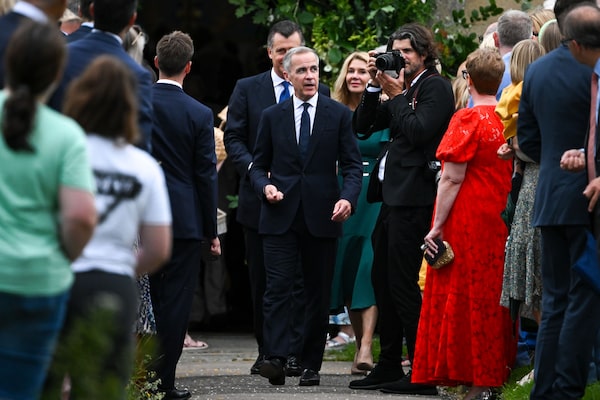
Former governor of the Bank of Canada and Bank of England Mark Carney walks out from St. Mary's Church, in Bruton, U.K. on July 8, 2023.Finnbarr Webster/Getty Images
Mark Carney might be setting the stage to run for the Liberal leadership after the next election. Or he might be auditioning for a role as the new blood in Justin Trudeau’s embattled government.
Certainly, the former governor of the Bank of Canada and Bank of England is making it clear that he wants to be the next leader of the Liberal Party, and he has started giving the sort of speeches about his political vision that candidates use to brand their leadership campaigns.
But Mr. Carney is getting competing advice from key Liberal supporters about when he should take the leap into electoral politics – including some arguing that he should not wait until next year’s general election but seek to run in a by-election later this year and play a part in the Prime Minister’s attempts to turn Liberal fortunes around.
With Mr. Trudeau’s government running nearly 20 points behind the Conservatives in most polls, Mr. Carney could steer clear of the potential car wreck of the Liberals’ last months, run in next year’s general election, and hope to win the party leadership after Mr. Trudeau is gone.
But he has been teasing Liberals for years with hints that he will run – and stalwarts might hold it against him if he waits on the sidelines until the fight against Pierre Poilievre’s Conservatives is all but over.
So far, the question is still hypothetical. A seat in the Commons would have to be opened up for him, presumably in Ottawa, where Mr. Carney lives. And the critical question is whether Mr. Trudeau wants to bring him in to play such a role – presumably as the government’s leading economic minister.
There have been conversations about it. Mr. Trudeau tried to recruit Mr. Carney to his cabinet in 2021, when Mr. Carney decided to stay out of politics, publicly citing his work as a UN special envoy on climate change as the reason.
But at this point, Mr. Trudeau’s team is running out of options to turn things around.
Nearly half of Canadians have negative opinion of latest Liberal budget, poll suggests
Certainly, there isn’t much time left: If there is no movement in the polls by summer, and the PM still insists on leading the party in the next election, he will have to shake things up. He’d have to make an attempt at a reboot, perhaps proroguing Parliament, offering a repackaged agenda and recruiting high-profile new figures such as Mr. Carney.
The speech Mr. Carney gave Tuesday in Toronto, at an event organized by Canada 2020, a Liberal-minded think tank, might cast doubt on whether Mr. Carney would want to take on that kind of role.
He criticized last week’s federal budget for not focusing enough on economic growth, warned of a slide in Canada’s productivity and stated that “governments that spend too much and invest too little will pay a heavy price.” But he also levelled a rhetorical barrage against Mr. Poilievre as a politician interested only in demolition and “Pavlovian” free-market extremism, and argued that clean energy will be critical to growth.
It was essentially a call to return to the abandoned political centre, along with an economic analysis that sounded thoughtful and adult compared with Canada’s current cartoon politics.
After that speech, bringing Mr. Carney into cabinet would look like a shift from Liberal economic policy under Mr. Trudeau and Finance Minister Chrystia Freeland. But he might also offer the Liberals a chance to reset their economic message.
The Liberals are plainly losing the economic argument, and Mr. Carney is one of the few heavyweight figures that the Prime Minister could call upon who has the potential to shift it.
If the Liberals don’t cut into the Conservative lead by summer, Mr. Trudeau has time to implement one more effort to reverse Liberal fortunes before next year’s campaign.
One might think that last, desperate assault is something an ambitious leadership aspirant should avoid. But the knock on the former central banker is that he doesn’t have real experience in the political trenches.
There’s only one way to dispel that, so some are urging him to jump in sooner. Once again, the question about Mr. Carney is when he will run.